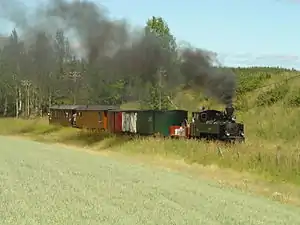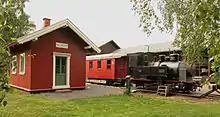Urskog–Høland Line
The Urskog–Høland Line (Norwegian: Urskog–Hølandsbanen), also known as Tertitten, is a narrow gauge railway between Sørumsand and Skulerud in Norway.
| Urskog–Høland Line | |
|---|---|
| Norwegian: Urskog–Hølandsbanen | |
 Loco No. 7 Prydz with a mixed train on the Urskog–Hølandsbanen, 18 July 2006 | |
| Commercial operations | |
| Original gauge | 750 mm (2 ft 5 1⁄2 in) |
| Preserved operations | |
| Preserved gauge | 750 mm (2 ft 5 1⁄2 in) |
| Commercial history | |
| Opened | 1896 |
| Closed | 1961 |

History
The original line was 57 kilometres (35 mi) long and was built in three stages: Urskogbanen opened in 1896, running from Bingsfossen to Bjørkelangen; Hølandsbanen from Bjørkelangen to Skulerud opened in 1898 and finally the line between Bingsfos and Sørumsand in 1903. Today part of the line is preserved as a museum at Sørumsand in Sørum kommune. The railway company was headquartered at Bjørkelangen. The line was built in the least expensive way as a so-called tertiary railway with a 750 mm (2 ft 5 1⁄2 in) gauge track. This gave the line its diminutive, affectionate nickname, "Tertitten". The railway was run as a privately owned joint stock company until 1945 when it was bought by the government and run by the Norwegian State Railways (NSB) under the name Aurskog-Hølandbanen.
The basis for the railway lay mostly in forest and agriculture products. Lumber was transported to Skulerud and from there it was rafted to Halden. At one time a tour billed as "The Great Roundtrip" was a popular tourist attraction, combining the train ride with a boat ride on the steam ship "DS Turisten" which trafficked the Halden Canal.
The restoration
A cooperative consisting of volunteers was established in 1961 with the aim of securing the line for posterity. A 3-kilometer track at Sørumsand was given to the group along with two steam locomotives and some other stock. The first run as a heritage railway was undertaken in 1966. This stretch had no buildings or side tracks, and all facilities which meet the present-day visitor was built after becoming a heritage railway. Three of the steam locomotives and two passenger carriages were restored.
When the heritage railway was established the terminus was just outside the town center of Sørumsand, with the track leading to the station building already having been removed. In 1987 the line had been extended and the first train could depart from the town center again. After another two years the entire operation, including station building, was finished, and the extended track was officially inaugurated. The entire complex is protected by law. The Urskog–Høland Line is now a museum under the umbrella of Museene i Akershus (MiA) run i cooperation with "Venneforeningen Tertitten".
Locomotives
Urskog-Hølandsbanen | |||||||||||||||||||||||||||||||||||||||||||||||||||||||||||||||||||||||||||||||||||||||||||||||||||||||||||||||||||||||||||||||||||||||||||||||||||||||||||||||||||||||||||||||||||||||||||||||||||||||||||
|---|---|---|---|---|---|---|---|---|---|---|---|---|---|---|---|---|---|---|---|---|---|---|---|---|---|---|---|---|---|---|---|---|---|---|---|---|---|---|---|---|---|---|---|---|---|---|---|---|---|---|---|---|---|---|---|---|---|---|---|---|---|---|---|---|---|---|---|---|---|---|---|---|---|---|---|---|---|---|---|---|---|---|---|---|---|---|---|---|---|---|---|---|---|---|---|---|---|---|---|---|---|---|---|---|---|---|---|---|---|---|---|---|---|---|---|---|---|---|---|---|---|---|---|---|---|---|---|---|---|---|---|---|---|---|---|---|---|---|---|---|---|---|---|---|---|---|---|---|---|---|---|---|---|---|---|---|---|---|---|---|---|---|---|---|---|---|---|---|---|---|---|---|---|---|---|---|---|---|---|---|---|---|---|---|---|---|---|---|---|---|---|---|---|---|---|---|---|---|---|---|---|---|---|
| |||||||||||||||||||||||||||||||||||||||||||||||||||||||||||||||||||||||||||||||||||||||||||||||||||||||||||||||||||||||||||||||||||||||||||||||||||||||||||||||||||||||||||||||||||||||||||||||||||||||||||


Steam
| Number | Name | Axle config | Type | Built by | Remarks |
| 4 | Setskogen | 2-6-2T | 2 cyl. steam | Sächsische Maschinenfabrik (Hartmann) 3356 of 1909 | NSB type XXVIII |
| 6 | Høland | 2-6-2T | 2 cyl. steam | Sächsische Maschinenfabrik (Hartmann) 4658 of 1925 | NSB type XXIX |
| 7 | Prydz | 2-6-2T | 2 cyl. steam | Henschel 28463 of 1950 | NSB type XXIX |
Diesel
| Number | Name | Axle config | Type | Built by | Remarks |
| 12 | Tinfos | ||||
| 14 | Bingsfos | UHB 1996 | Derived from NSB shunter | ||
| Skd 220 | B | Diesel-hydraulic | NSB | Normal gauge |
Rolling stock
Passenger
| Number | Type | Built by | Axle config | Description |
| 1 | Co | Skabo 1896 | 2-2 | 3rd class carriage |
| 2 | BCo | Skabo 1896 | 2-2 | 2nd and 3rd class carriage |
| 3 | BCo | Skabo 1898 | 2-2 | 2nd and 3rd class carriage |
| 5 | CFo | Skabo 1898 | 2-2 | Baggage and 3rd class carriage |
| 10 | BCo | Skabo 1913 | 2-2 | 2nd and 3rd class carriage |
| 100 | A 21 | Skabo 1926 | 2-2 |
Freight
| Number | Type | Built by | Axle config | Description |
| 1 | To | Skabo 1895 | 2-2 | Flatcar |
| 9 | G | Strømmen 1895 | 2 | Goods van |
| 13 | G | Strømmen 1895 | 2 | Goods van |
| 19 | K | Strømmen 1896 | 2 | Gondola car |
| 26 | Go | Moss Jernstøberi og Mek. vst. 1898 | 2-2 | Goods van |
| 27 | To | Moss Jernstøberi og Mek. vst. 1898 | 2-2 | Flatcar |